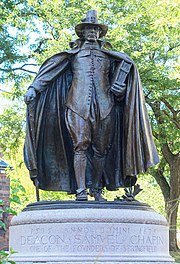| Part of a series on |
| Puritans |
|---|
 |
The reign of Elizabeth I of England, from 1558 to 1603, saw the start of the Puritan movement in England, its clash with the authorities of the Church of England, and its temporarily effective suppression as a political movement in the 1590s by judicial means. This led to the further alienation of Anglicans and Puritans from one another in the 17th century during the reigns of King James and King Charles I, that eventually brought about the English Civil War, the brief rule of the Puritan Lord Protector of England Oliver Cromwell, the English Commonwealth, and as a result the political, religious, and civil liberty that is celebrated today in all English speaking countries.
The English Puritan movement in the reign of Elizabeth and beyond sought to further the work of reforming the Church of England, eradicate the influence of Roman Catholicism in the land, as well as promote the national interest of the English crown and the English people under a united Protestant confession that was in strict conformity to the Bible and Reformed theology. This Puritan vision that began in the Elizabethan era would eventually result in the Westminster Assembly and the Westminster Standards, including Westminster Confession of Faith, the Shorter Catechism, and Larger Catechism, and the Directory for Public Worship.